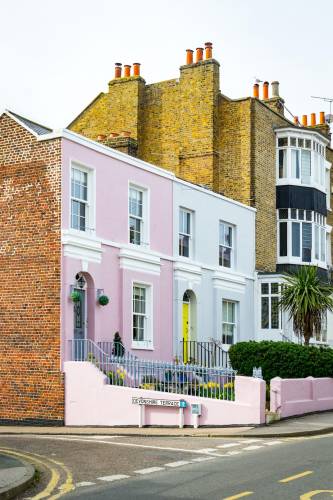A First Time Buyer’s Guide to 95% Mortgages
The Chancellor’s newly announced mortgage guarantee scheme could have a lot of benefits for first time buyers, but how exactly does it work? We spoke to mortgage adviser Tony Baker, from Chambers Financial Services, to find out his advice for first time buyers.
Being a first-time buyer in the current climate is not easy – on top of expensive deposits and ever-changing financial requirements, the buying process is complicated and can be difficult to wrap your head around. In this article, we explain how exactly the Chancellor’s budget announcement might benefit you as a first-time buyer, and how to smash your first purchase like a seasoned pro.
What changes have been made?
During the pandemic, mortgage lenders stopped giving out low-deposit mortgages. Many banks and lenders felt they could only offer a maximum 90% loan-to-value mortgage or even less, meaning buyers would have to pay at least a 10% deposit – a large sum of money if you want to live in the City.
95% mortgages were taken off the market during the pandemic as lenders became worried about the risks of lending in an uncertain market combined with a backlog of mortgage applications, as demand surged after the first lockdown. This disproportionately affected first-time buyers, as those further up the ladder were able to afford to pay a slightly bigger deposit.
From April this year, 95% mortgages will be available to buyers of properties below £600,000. You’ll be able to fix your initial mortgage rate for at least 5 years. This means, if you bought a property for £500,000*, your minimum deposit will be £25,000, as opposed to £50,000 with a 90% mortgage. It is guaranteed that your repayments will be frozen for the first 5 years, giving some added security and the ability to plan your finances a little better.
This is good news for many first-time buyers, Tony tells us.
“The mortgage market has been tough on first time buyers – for most of last year you needed a 15% deposit to be able to secure a property.”
“While the help-to-buy equity scheme is available for people with a 5% deposit, it’s specific to new builds. This initiative will open up a lot more choice for first time buyers who are paying rent and household expenses and can’t build up a huge deposit.”
The scheme works by giving lenders the option to purchase a government guarantee for the mortgages they give out, which will ‘increase the appetite of mortgage lenders for high loan-to-value lending to creditworthy customers’. You won’t need to do anything differently in order to benefit from the scheme, as the mortgage guarantee is between the lender and the government.

What else do first time buyers need to know?
- The UK average deposit put down by first time buyers is 22%
- Average household salary needed to buy a 2-bed property in London is £92,000
- The average number of years of a first-time buyer mortgage is 29 years
- First-time buyers will continue to get Stamp Duty discounts after the holiday has ended for everyone else – although it will drop, from not paying Stamp Duty on the first £500,000 to the first £300,000
When and how do you apply for a 95% mortgage?
Because lenders usually offer loans of up to 4.5 times your combined salary, if you were purchasing the home in our example – for £500,000 – you will still need to have a joint salary of well over £100,000 to be able to apply.
The government scheme is designed to increase the availability of 95% mortgage loans, which are known as ‘products’. At the start of this year, there were only 5 of these products available, compared to 405 during the same period in 2020. Already Lloyds, Natwest, Santander, Barclays and HSBC have said they will offer 95% mortgages, but more providers may join them – all depending on how much demand there is in the market, and how well the economy is recovering.
Not all lenders will be offering the 95% mortgage, so factor this in when you’re researching and preparing to apply for your mortgage. We explain the process below, so you know how the mortgage application works, and how it affects other parts of your transaction. We do also recommend you contact a broker for guidance.
Risks of a 95% mortgage
The higher your mortgage, the more likely you are to fall into something called negative equity. This is when house prices fall, and you owe more money to your mortgage lender than your house is actually worth. This makes selling or remortgaging your home very difficult.
To avoid this, you might want to up the amount of deposit you pay – this means your loan will be slightly smaller, often 90%. So, even if your house price drops a little bit, your loan is still less than the house is worth. Equally, keep an eye on the house prices in your ideal location to see if they are rising or falling so you can make an informed decision if you do go with a 95% mortgage.
However, Tony says it’s important to balance this risk with how soon you’re likely to sell.
“We are in uncertain economic times and this may affect property prices, although the Bank of England are quite positive that we’ll be back to a pre-Covid economy by next year. Therefore, if you have a small stake in your property and you need to sell during a period where property prices have slumped then this could mean you are in a negative equity position and therefore the sale price may be insufficient to repay the mortgage.
However, negative equity only is an issue should you wish to sell or raise additional funds against your property and at the end of the day, if it’s your family home it doesn’t matter how much it’s worth – because it’s your home.”
It’s also important to note that a higher loan to value mortgage will have a much more stringent application process.
“Ultimately, if you’ve got an applicant with a small blip on their credit file, it will be much harder to get a mortgage with a small deposit. Most lenders want to lend to people with clean credit files so that’s something to bear in mind.”
Tony also points out that some products are likely to have restrictions – Accord’s recently announced 95% product, for example, is not available for flats, new builds and is only available up to £500,000. It will be important to thoroughly research which is the best mortgage product for you once you decide to make a move.
Generally the higher the deposit you’re able to pay, the lower the interest rate on the mortgage. This is because the bank is taking a lower risk. However, the government guarantee for the 95% mortgages is designed to help lenders offer high loan to value mortgages by reducing the risk to the lender.
How does the mortgage application and purchase process work?
1. Research – figure out your ideal location and what you can afford, including upfront funds, loans (e.g. mortgage) and fees.6. Once your offer is accepted, advise your solicitor to start the conveyancing process.
8. Meanwhile, your solicitor will conduct searches and review the information provided by the seller’s solicitor.
9. Once you have your mortgage offer and your solicitor has replies to all the relevant enquiries, you can agree a completion date with the seller, sign your contract, transfer your deposit to your solicitor, and proceed to exchange. The exchange date is the day that you and the seller are contractually bound. The completion date is the day you finally get the keys to your new home.
11. Post completion your solicitor will have a few more bits of paperwork, such as paying stamp duty, registering your ownership and getting your title deeds over to your mortgage lender.
We will see how the market takes shape in the coming months as we emerge from the pandemic. What’s certain is that the government are doing all they can to keep the housing market moving and these measures, together with record low interest rates, are certainly helping to keep buying activity at levels that we’ve not seen for many years.
We have plenty of experience helping first time buyers make their first move with confidence. We work closely with mortgage lenders, and we're happy to match you with the right mortgage partner for your needs. Follow @lauruslaw on Instagram for regular updates and expert insights the London housing market.
Speak to a lawyer – get in touch on 020 3146 6300 or hello@lauruslaw.co.uk.
*Average house price for FTBs in Bromley according to Zoopla.











